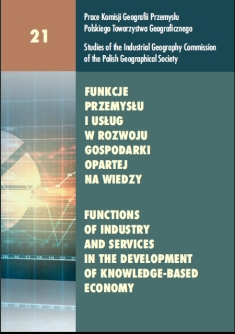Prospects of the Use of Shale Gas in the EU Power Sector
DOI:
https://doi.org/10.24917/20801653.21.4Keywords:
power sector, energy policy, energy security, conventional gas, unconventional gas, shale gas, hydraulic fracturing, „shale revolution”Abstract
Apart from the uncertainty associated with changes in the demand for gas, the discussion oninternational gas markets is dominated by the question of gas production from unconventional sources,including shale. Because the acquisition and use of shale gas in the United States had a significantimpact on the economy and led to a significant gas prices fall, reduction of production costs and theincrease of the economy competitiveness as well as many other effects known as “shale revolution”.European Union is currently absorbed by the discussion of shale gas use in the EU energy sector. Onthe one hand, there are many positive effects of “shale revolution” in the United States and Canada, theexploitation of shale gas can reduce the dependence on gas imports from Russia and increase energysecurity. But on the other hand, shale gas is indicated as a potential threat to the environment, includingthe possibility of groundwater contamination.
This article is an attempt to find answers to the following questions: - whether the European Unioncountries possessing potential shale gas resources will decide to explore them and to what extent,- what the potential effects of the “European shale revolution” for the individual countriesas well as for the whole European Union are, - what the prospects for shale gas to be included incommon energy policy are, or whether decisions in this matter will remain the sovereign responsibilityof EU countries?It seems that shale gas is an opportunity for the EU energy sector; however, its exploitation and usagewill depend primarily on attitude of EU members, their energy mixes and the standpoint of theEuropean Union regarding this issue.
Downloads
References
Beckman, K. (2011). European Energy Review. Dutch Energy Council embraces unconventional gas, 09.02.2011 r.
BP (2012). BP Statistical Review of World Energy 2012.
European Commission, Directorate-General for Energy and Transport (2008). European Energy and Transport, Trends to 2030 – update 2007. Office for Official Publications of the European Communities, Luxembourg.
European Commission (2010). Energy 2020. A strategy for competitive, sustainable and secure energy. Communication from the Commission to the European Parliament, the Council, the European Social and Economic Committee and the Committee of the Regions, COM (2010) 639 final, Brussels.
Eurostat, European Commission (2010). Energy – Yearly Statistics 2008. Publications Office of the European Union, Luxembourg.
(2012). The Economic and Employment Contributions of Unconventional Gas Development in State Economies.
International Energy Agency (2012). Golden rules for a Golden Ages of Gas. World Energy Outlook Special Report on Unconventional Gas, International Energy Agency.
Instytut Kościuszki (2012). Wpływ wydobycia gazu łupkowego na rozwój społeczno-ekonomiczny regionów – amerykańskie success story i potencjalne szanse dla Polski. Kraków.
Nash, K. (2010). Shale Gas Development. Nova Science Pub Inc.
Orlen (2010). Gaz Łupkowy. Podstawowe informacje. Warszawa.
Pach-Gurgul, A. (2012). Jednolity rynek energii elektrycznej w Unii Europejskiej w kontekście bezpieczeństwa energetycznego Polski. Warszawa: Wydawnictwo Difin.
Polski Instytut Spraw Międzynarodowych (2011). Gaz łupkowy – szanse i wyzwania dla Polski i Unii Europejskiej w świetle doświadczeń amerykańskich i rozwoju międzynarodowego rynku gazu. Warszawa.
Rada Unii Europejskiej (2011). Konkluzje Rady Unii Europejskiej z 4 lutego 2011 r. EUCO 2/11.
European Parliament, Committee on the Environmental, Public Health and Food Safety.
Coordinators’ meeting, 17.02.2011 r. (2012, 17 grudnia). Pozyskano z: http://www.europarl.europa.eu/ document/activities/cont/201102/20110218ATT13929/20110218ATT13929EN.pdf.
KE rozpoczyna konsultacje społeczne w prawie gazu łupkowego (2012, 21 grudnia). Pozyskano z: http://lupkipolskie.pl/aktualnosci/newsy-ze-swiata/12-2012/ke-rozpoczyna-konsultacje-spoleczne¬-ws-gazu-lupkowego.
Niemiecki Parlament odrzucił zakaz szczelinowania hydraulicznego (2012, 14 grudnia). Pozyskano z: http://www.lupkipolskie.pl/aktualnosci/newsy-ze-swiata/12-2012/niemiecki-parlament-odrzucil¬-zakaz-szczelinowania-hydraulicznego.
Ocena zasobów wydobywalnych gazu ziemnego i ropy naftowej w formacjach łupkowych dolnego pa¬leozoiku w Polsce (basen bałtycko-podlasko-lubelski). Raport pierwszy.
(2012, 17 grudnia). Pozyskano z: http://www.pgi.gov.pl/en/dokumenty-in/doc_view/771-raport-pl.html.
Rumunia zmieni zdanie w sprawie łupków (2012, 27 grudnia). Pozyskano z: http://lupkipolskie.pl/aktu¬alnosci/newsy-ze-swiata/12-2012/rumunia-zmieni-zdanie-w-sprawie-lupkow.
Rząd w Londynie zniósł zakaz wydobycia gazu łupkowego metodą szczelinowania (2012, 13 grudnia). Pozyskano z: http://www.lupkipolskie.pl/aktualnosci/newsy-ze-swiata/12-2012/rzad-w-londynie- -zniosl-zakaz-wydobycia-gazu-lupkowego-metoda-szczelinowania.
Trembath, A. CNN Blows Obama SOTU Shale Gas Fact-Check (2012, 25 stycznia). Pozyskano z: http:// thebreakthrough.org/blog/2012/01/cnn_blows_obama_sotu_shale_gas.html.
(2012, 17 grudnia). Pozyskano z: http://205.254.135.7/electricity/monthly/epm_table_grapher.cfm?t=ep¬mt_5_3.
(2012, 17 grudnia). Pozyskano z: http://wyborcza.biz/biznes/1,100896,11550543,Gaz_lupkowy__Sklad-niki_plynu_do_szczelinowania_sa.html, przygotowane na podstawie danych Energy Information Administration.
Downloads
Published
How to Cite
Issue
Section
License
Articles are published under the terms of the Creative Commons License (CC BY-ND 4.0; Attribution– NoDerivs).

